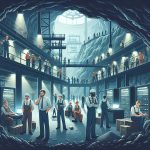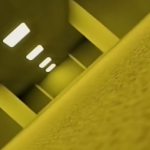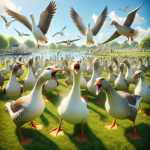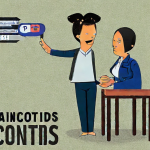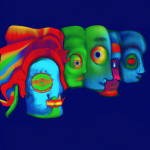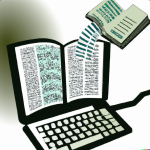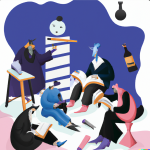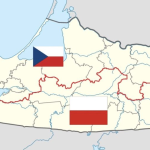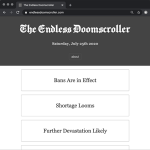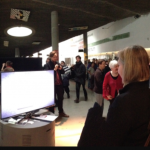2025
Rob Wittig and Talan Memmott reminisce about their favorite Netprovs, discuss the ways improvisation on the Web can be tackled, and theorize the future possibilities of the Netprov form after a step back from the platform formerly known as Twitter.
Experimental storyteller and digital artist Mez Breeze explores the liminal spaces of The Backrooms, a found footage web series which is based on a popular creepypasta of the same name. In doing so, Breeze confronts the feelings of alienation and predation inherent to late-stage capitalist society.
2024
Rob Wittig chats with William Gillespie about working with constraints and word plays, all the while emphasizing the netprov’s community building potential (a particularly big ellipsis needed, anyone?)
Scott Rettberg, Director of the Center for Digital Narrative (CDN), interviews Flourish Klink, podcaster and fandom expert, about their rich history with fandom and fan culture.
Davin Heckman on how his penchant for pranks got him to appreciate netprov and how he turned it into a versatile pedagogic tool that helps to broaden his students’ social sensibilities.
2023
Rob Wittig and Harlin/Hayley Steele — a larpmaker and media artist whose work explores tactical performance and “narrative care,” a collaborative process of excavating narratives that have been pushed underground through systematic forms of harm — discuss Harlin/Hayley’s roots in the live action roleplaying (LARP) world and synergies between LARP and netprov. While laughing a lot.
"Why," Serafina Aquilino asks, "is Internet literature so popular in China, compared to other countries?" The answer may be found in the Chinese "unique literary production." Print, nothing less, is responsible for China's world leadership in e-Lit. An unexpected emergence that Aquilino describes in her "brief history" of e-Lit in China, from Cai Zhiheng’s The First Intimate Contact (1998) to the present rise of Chinese literary forums and literary websites.
Rob Wittig and Alex Mitchell discuss the very beginnings and the most recent iterations of Netprov, with a focus on generative AI, collaboration and improvisational writing.
Rob Wittig and Scott Rettberg discuss the pioneer times in digital writing and electronic literature, a time long ago, in a Galaxy far away, when the audience at literary events did not have a clue about hypertext and links.
Rob Wittig and JT Johnson – a digital artist and writer – chat on the beginnings of Netprov, design of fictional worlds, and talent shows.
Image: DALL·E 2023-03-02 20.01.05 - "electronic literature can only exist up to a certain point, and then it dissolves itself as it becomes a discipline."
Rob Wittig and Johannah Rodgers – an independent scholar and a digital writer – discuss the collaborative and community-building nature of Netprov.
Image: DALL·E 2023-03-02 19.55.13 - "a group of people writing collectively a novel on financial crisis."
Rob Wittig and Claire Donato - a writer, a multidisciplinary artist, and a netprov contributor – discuss how a sense of performativity linked with playfulness and joy of collaborative improvisation constitute the very core of netprov.
Image: DALL-E, at a prompt: “A futuristic image of a group of people and AI improvising a theater play”.
Rob Wittig and Jean Sramek - a playwright and netprov contributor – discuss how netprov as networked collaborative writing has changed since one of its earliest instance, Grace, Wit & Charm.
Image: DALL-E, at a prompt: “A group of people, plants and animals collaborating on digital platforms to write a poem”
2022
Anna Nacher chats with Mark Marino, Cathy Podeszwa, Joellyn Rock, and Rob Wittig—artists, designers, and new media theorists all—to discuss the impetus and impact of their long-running netprov collaborations (communal and improvisational creative writing conducted online). Interview conducted October 2022.
Anna Nacher explores the emergence and spread of the viral hashtag "Kralovec," a satirical Czech language meme protesting the Russian annexation of Ukrainian territory in September 2022. In discussing the social and political impact of memes as collaborative sites of making meaning through media, Nacher analyzes the "creative frenzy" that emerges when protest becomes memetic.
As a follow up to the series of interviews with Ben Grosser in February and March 2021 (published later that year in ebr), we include here a more settled, post-pandemic set of reflections. In the interviews, Grosser noted how "the realities of the pandemic necessitated back then," and maybe still does, "a degree of vigilance about new information": is there anything new that we need to know? The flood of information, however, has been less about knowing and acting on that knowledge than it is about keeping us engaged, and returning us daily, hourly, and minute by minute to our digital doomscrolls. For this newly produced populace that is largely stuck online, Grosser here discusses a net art / e-lit project of his own, an alternative software interface called The Endless Doomscroller.
A critical encounter with one of alt-lit (alternative literature) movement’s most renowned contributors, whose moment (like many in this scene) has passed. Citing Christian Howard, Leah Henrickson advances the argument that “[w]e’re at a turning point in literary studies, and we need to confront how the changes in mode are affecting – and are affected by – the alternative networks of circulation within these digital spaces.”
2021
In a series of interviews led in February and March 2021, Nacher, Pold and Rettberg examined how contemporary digital art and electronic literature responded to the pandemic. Their project on COVID and electronic literature was funded by DARIAH-EU and resulted in the exhibition prepared for the ELO 2021 Conference & Festival and the documentary film that premiered in June 2021 at the Oslo Poesiefilm Festival. Ben Grosser is one of the creators of 13 works that were interviewed for the project. He generously shares his thoughts on life and creative practice during the pandemic, the impact of platforms on the digital culture and creativity and platform culture in general.
To browse the internet is to subject oneself to sophisticated and unceasing techniques of attention-capture, of which the pop-up advertisement is only the most crass and vexatious example. This paper describes the development of Nightingale, a web browser extension that fights distraction with distraction. It does this by injecting the web with pop-up ads consisting of semantically-relevant fragments of the poetry of Keats. Nightingale represents an attempt to engage in “noöhacking”—that is, repurposing the cognitively-destructive aspects of contemporary digital media in order to care for one’s own mind.’
2020
Søren Pold takes up the task to deconstruct the present cultural moment when the effects and ways of operating of social systems, as discussed by Johanna Drucker in her recent book, are becoming central interfaces to a broad range of lived reality. Pold’s offers a valuable effort at understanding the complex mechanisms of production of such systems via investigation of rhetorical and software aspects of networked media. With the focus on artistic research installation, The Oracle of Selphie by Jakob Fredslund and Malthe Stauning Erslev in collaboration with Pold and coupled with his own installation platform The Poetry Machine, Pold interrogates to what extent Drucker’s arguments allows for a critical approach to reading patterns in social media. Doing so, he simultaneously offers models of distracted reading grounded in the propositions by Michel de Certeau, Siegfried Kracauer, Walter Benjamin, and Olga Goriunova, demonstrating that “lurking” and other forms of inattentive reading can be exploited and turned into profit in the age of the platform capitalism. Such an observation calls for further research that would better grasp the nature of networked reading practices enabled (and more often forced) by our contemporary social media platforms.
